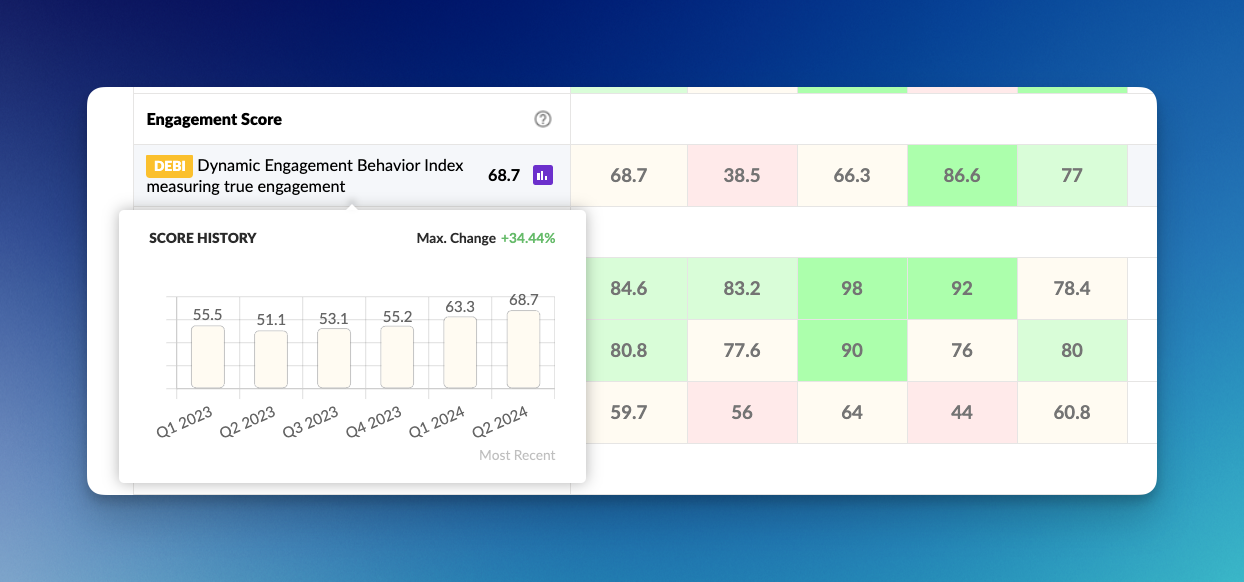Unlocking the Power of Weighted Behavioral Analytics to Measure and Foster Employee Engagement
Employee engagement is a critical factor in determining organizational success. Traditional methods of measuring engagement, such as annual surveys, have proven inadequate, often relying on employees' self-reported feelings about various aspects of their work. We offer a novel approach to measuring true employee engagement: the Dynamic Engagement Behavior Index (DEBI).
DEBI is a proprietary algorithm that leverages behavioral analytics to provide a real-time, accurate, and actionable measure of employee engagement. By focusing on key behavioral factors that indicate an engaged workforce, DEBI offers a comprehensive and reliable assessment of engagement levels across individuals, teams, and entire organizations.
The index incorporates five essential components:
- Daily Pulse Survey Response Rate Score (DPSRRS): Tracking responsiveness to pulse surveys, DPSRRS measures employees' daily check-in consistency.
- Open-feedback Rate Score (OFRS): Evaluating the frequency and consistency of open-ended feedback participation, OFRS gauges employees' willingness to share their thoughts and ideas.
- Open-feedback Effort Score (OFES): Assessing the depth of engagement through the length and quality of feedback provided, OFES identifies highly engaged employees who invest time and effort in sharing valuable insights.
- Recognition Participation Rate Score (RPRS): Analyzing how actively employees engage in recognizing their peers, RPRS reflects the level of community engagement and positive reinforcement within the organization.
- Values Alignment Score (VAS): Quantifying how well recognitions align with company values, VAS ensures that employee actions are consistent with the organization's core principles.

The Daily Pulse Survey Response Rate Score (DPSRRS) is assigned the highest weight of 0.34, as it reflects employees' consistency in participating in daily check-ins. This score is crucial because it demonstrates an individual's commitment to providing regular feedback and staying connected with the organization. A high DPSRRS indicates a strong desire to contribute and be heard, which is a fundamental aspect of engagement.
The Open-feedback Rate Score (OFRS) and Recognition Participation Rate Score (RPRS) are each weighted at 0.22. OFRS measures employees' willingness to share their thoughts and ideas through open-ended feedback, while RPRS assesses how actively employees engage in recognizing their peers. These scores are essential because they showcase an employee's dedication to contributing to the organization's growth and fostering a positive work environment. Engaged employees are more likely to provide constructive feedback and acknowledge their colleagues' achievements, strengthening the overall team dynamic.
The Open-feedback Effort Score (OFES) and Values Alignment Score (VAS) are each assigned a weight of 0.11. OFES evaluates the depth of engagement by analyzing the length and quality of feedback provided, identifying highly engaged employees who invest time and effort in sharing valuable insights. VAS, on the other hand, quantifies how well recognitions align with company values, ensuring that employee actions are consistent with the organization's core principles. While these scores have a lower weight compared to the others, they still play a significant role in determining an employee's overall engagement level.
By combining these five scores, DEBI generates a comprehensive engagement score ranging from 0 to 100.
- Scores below 40 are considered poor
- Scores between 40 and 70 are deemed okay
- Scores above 70 indicate a highly engaged workforce
This score provides a holistic view of an individual's, team's, or organization's engagement level, enabling leaders and HR professionals to make data-driven decisions to improve engagement and foster a strong culture of accountability.

The real-time nature of DEBI allows companies to proactively address engagement blockers and reward individuals, teams, and the organization for demonstrating strong engagement. By linking engagement scores to tangible benefits, such as recognition, professional development opportunities, or performance bonuses, organizations can create a culture that values and encourages active participation, continuous feedback, and alignment with company values.
Moreover, DEBI's insights can be used to identify best practices and success stories within the organization. By highlighting teams or individuals with consistently high engagement scores, companies can analyze their strategies and replicate them across the organization, creating a ripple effect of positive engagement and accountability.
The days of relying on unreliable and faulty engagement scores measured annually are over. With the advent of the Dynamic Engagement Behavior Index and the support of people analytics tools like Happily.ai, organizations can now unlock the true potential of their workforce, fostering a culture of engagement, innovation, and success.









